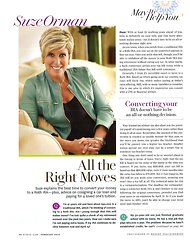 Chris Hinkle for The New York Times Pilar Ruiz chaperones her daughter Mary on most of her cookie-selling expeditions but does not sell cookies on her behalf.
Chris Hinkle for The New York Times Pilar Ruiz chaperones her daughter Mary on most of her cookie-selling expeditions but does not sell cookies on her behalf.
In this weekend’s Your Money column, I told the story of Mary Ruiz, who sold 5,007 boxes of Girl Scout cookies last year as a 9-year-old, more than nearly any girl in the United States.
When you sell that many cookies, there are bound to be questions. Some parents in Tucson questioned whether her mother, Pilar, was pushing her too hard. Pilar and Mary Ruiz said this was not the case.
Meanwhile, several readers posted comments and sent me e-mails wanting to know how many cookies Pilar Ruiz sold herself. After all, they said, parents bring order forms to their offices all of the time and sell lots of cookies there without any assistance from their daughters.
But Ms. Ruiz said she did not sell cookies on behalf of her daughter, though she did bring her daughter to the American Airlines call center where she worked before she began working from home. And if she had sold cookies on her daughter’s behalf, it would have been against the Girl Scout rules, something that will probably come as a big surprise to all of the parents who have been selling cookies themselves for years and all of the buyers who have happily bought from them.
“We know that this happens, and we don’t approve,” said Amanda Hamaker, manager of product sales for Girl Scouts of the USA. “We actively discourage the activity, but it’s not something we can police. I don’t get phone calls in the middle of the day saying, ‘I work for so-and-so corporation, and there’s an unsanctioned order card on the break room table and what are you going to do about it?’”
So what’s a conscientious buyer to do if the parents don’t know the rules or openly defy them?
Ms. Hamaker suggests gently telling the parent that you’ll happily buy if you get a call from the girl herself. I told her I feared that in this day and age, people might wonder if potential buyers were a bit creepy if they made requests like that, but she countered that if colleagues were selling at the office, then presumably they knew your intentions were pure.
When you do get the scout herself on the phone, ask about her goals and what her troop hopes to do with its share of the money. “Make a connection with the girl,” Ms. Hamaker said. “That’s how she’s going to learn.”
How have you handled such situations?
Article source: http://bucks.blogs.nytimes.com/2013/02/12/the-right-and-wrong-way-to-buy-girl-scout-cookies/?partner=rss&emc=rss
